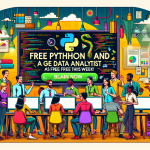Embarking on the journey into data science can often feel overwhelming. The vast array of tools, languages, and the complexity of data itself can deter even the most eager learners. However, with persistence, curiosity, and the right resources, anyone can transform from a novice to a data science professional. In this post, I reflect on my personal journey into data science, sharing insights, challenges, and the milestones that shaped my experiences.
Understanding the Basics
When I first stumbled upon data science, my knowledge was minimal. Like many beginners, I found myself lost in a sea of jargon: machine learning, algorithms, data visualization, and big data. To lay the groundwork for my understanding, I focused on the following:
- Statistics: A solid grasp of statistics was essential. I dove into topics like probability, distributions, and hypothesis testing, which are foundational for analyzing data.
- Programming: Learning Python was a game-changer. Its simplicity and an extensive array of libraries dedicated to data analysis (like Pandas and NumPy) made it approachable for beginners.
- Data Manipulation: Understanding how to clean and manipulate data before diving into analysis was crucial. I spent hours working with real datasets to hone this skill.
Experiencing Challenges
No journey is without its hurdles, and mine was no exception. The landscape of data science is ever-evolving, and I often felt like I was trying to drink from a fire hose. Some of the significant challenges I faced included:
- Overwhelming Information: The sheer volume of online courses and resources can lead to analysis paralysis. I had to learn to filter through content to find what was truly beneficial.
- Imposter Syndrome: Early on, I frequently questioned my abilities. Comparing myself with more experienced data scientists made me feel inadequate, but I learned to celebrate small achievements instead.
- Technical Hurdles: Debugging code and understanding machine learning models often felt daunting. However, I found solace in online communities and forums where I could seek help.
Building Skills through Projects
As I progressed, I realized that theoretical knowledge needed to be complemented with practical experience. Thus, I embarked on various projects that allowed me to apply what I had learned:
- Personal Projects: I started with small projects like analyzing my personal fitness data, which deepened my understanding of data visualization techniques.
- Kaggle Competitions: Entering Kaggle competitions was a turning point. These challenges exposed me to real-world problems and innovative solutions proposed by the data science community.
- Collaborative Efforts: Teaming up with fellow aspiring data scientists enabled me to learn from others, share knowledge, and foster collaboration in tackling more complex projects.
Networking and Community Involvement
One of the best decisions I made during my journey was to connect with the data science community. Engaging with like-minded individuals helped me expand my knowledge and stay updated on industry trends. Here’s how I got involved:
- Meetups and Conferences: Attending local data science meetups and participating in conferences allowed me to leverage collective knowledge and network with industry professionals.
- Online Forums: Platforms like Stack Overflow and Reddit became invaluable. I found answers to my questions and discovered exciting projects and trends.
- Social Media: Following data science influencers and practitioners on Twitter offered insights into their experiences and exposed me to diverse perspectives.
Staying Current with Industry Trends
The data science field evolves rapidly, making it vital to stay updated on industry trends. I adopted a few strategies to keep my skills relevant:
- Continuous Learning: I enrolled in advanced courses on machine learning and deep learning through platforms like Coursera and edX.
- Reading Blogs and Research Papers: Subscribing to notable data science blogs and following new research provided insights into cutting-edge developments.
- Experimentation: Hands-on experimentation with new tools and frameworks, such as TensorFlow and PyTorch, helped me understand their applications and best practices.
Landing My First Data Science Job
After months of hard work, self-discovery, and a commitment to learning, I finally landed my first role as a data scientist. It was a proud moment, validating my efforts and the skills I had built along the way.
In the role, I encountered new challenges and continued my learning journey:
- Real-World Applications: Applying data science theories to business problems brought my learning full circle and added new layers to my understanding.
- Collaboration with Cross-Functional Teams: Working with teams from different departments deepened my appreciation for the interdisciplinary nature of data science.
- Continuous Skill Development: I embraced a culture of ongoing learning, regularly attending workshops and courses to enhance my expertise.
Conclusion: The Journey Continues
My journey into data science taught me valuable lessons about resilience, curiosity, and the importance of community. While I have transitioned from a beginner to a professional, I recognize that learning doesn’t end here. The field is constantly evolving, and my goal is to keep challenging myself, exploring new technologies, and contributing to the data science community.
For anyone considering embarking on a similar journey, remember that persistence is key. Take small steps, embrace the challenges, and never hesitate to reach out to the community for support. Your path to becoming a proficient data scientist is uniquely yours, and every step you take brings you closer to your goals.





